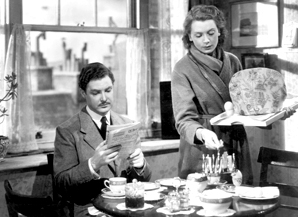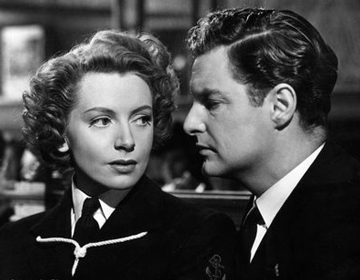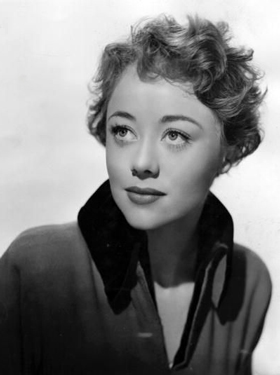
 |
|
|
|
Robert Donat didn't appear in all that many films, but the majority of them are exceptionally memorable. Turner Classic Movies shows a couple of his features co-produced by MGM in England during the war that are almost unknown over here. The Adventures of Tartu, aka Sabotage Agent, is a remarkable escapist war fantasy about a Brit spy who goes undercover in Nazi-held Romania to locate and destroy a secret arms factory. The film plays almost identically to a 1960s superspy story, complete with an utterly fantastic subterranean industrial complex created with special effects reminiscent of Things to Come and Metropolis. A couple of years later, with the war coming to an end, Donat starred in Alexander Korda's English-American coproduction Perfect Strangers, which was released in the states in a slightly shorter version. It's not particularly deep or significant but it does feature some marvelous playing by Donat, opposite three ambitious English actresses: Deborah Kerr, (age 23) Ann Todd (36) and Glynis Johns (21). The story hangs on the very real situation of married couples being separated by the war. For the American release MGM gave the film a title that sounds more like a screwball comedy, Vacation from Marriage. Just the same, the show earned an Oscar for its original story by Clemence Dane. Producer Alexander Korda's formidable directing efforts have been billboarded by The Criterion Collection but this show has become something of an unknown entity. 
The movie plays out in calm, low-key manner often attributed to Old School British films. Dull married couple Robert and Catherine Wilson (Robert Donat & Deborah Kerr) mope along though life. He's a clerk in a rut and she's let herself go as his housewife. When Robert is called up for Navy service he's denied a company perk offered other clerks -- his boss will pay the balance of their salaries as long as they serve, to make up for the low Navy pay. The separation changes the Wilsons' lives completely. Robert loses his moustache, makes friends, and eventually becomes an efficient Petty Officer with a more assertive attitude. Against her Robert's wishes, Catherine joins the Wrens and goes into civil defense. As their brief furloughs never coincide, the husband and wife can only communicate through letters. Robert's ship is sunk from underneath him, and he spends time in a hospital with burned hands. He has a flirtation with a beautiful nurse, Elena (Ann Todd). She listens to his self-pitying talk about his pre-war life. When Elena finally tells him of her own tragic situation, Robert is chastened. His best friend is a Scottish sailor, another survivor of the sinking. Catherine is part of a crew for a launch that carries messages for the Navy command (in London?). She makes fast friends with Dizzy Clayton (Glynis Johns), a practical Wren whose fiancé is unaccounted for in the Far East. Catherine also takes greater pride in her appearance, and develops a stronger self-identity. She's surprised when Dizzy's cousin, handsome naval engineer Richard (Roland Culver) spends time with her. She's even more surprised when Richard asks her to leave her husband. By the time the Wilsons finally get a chance to see each other, three years have passed. Each assumes that the other has remained the same, while they have become 'a different person'. On their way to meet, Catherine independently decides that she'll have to get a divorce. 
If it weren't for the acting (and directing) talent involved Vacation from Marriage might be little more than a schematic story concocted to address a social problem . The drastic changes in living exacted by the war broke up many, many marriages. The pre-war Wilsons are purposely drawn as non-entities. He mumbles and remains passive about everything, while she wanders around her flat in a dowdy funk, singing to herself the catchy romance tune These Foolish Things (Remind Me of You). War service shows them blossoming as personalities. Forced into positions of responsibility and interacting with a variety of people energizes them physically and mentally. There's more than a little messaging going on: the War has made them better people. But the actors bring the roles to life, and Korda's sensitive direction makes the film seem intimate and the problems of our couple important. The big reunion takes up the final third of the picture, and makes for some very good scenes. Dizzy can't believe that the dashing Naval Officer Robert is the loser husband that Catherine has been describing for so long, and Robert's friend feels the same way about Catherine. The foursome ends up on a dark London street trying to attract a taxi, when none are to be found. Will Catherine and Robert wake up and appreciate each other? The art direction is very good, with painted backdrops sketching in a bombed London, its skies dotted with barrage balloons. That extended final scene is quite satisfying, so much so that we wish that the script were more skillful with the opening. Robert and Catherine are initially a bit too much like lost souls. They of course will spring to life again, living in communal military disciplines. 
The movie's most clever concept is a detail about a wall that blocked the view from the Wilsons' window, making her apartment a depressing place. When Catherine opens the blackout curtains at film's end, they discover that the neighboring building is gone, having been knocked down by German bombs. They suddenly have a grand new view of "the future". The image works well, even though it sends an odd signal about the salvation of Catherine and Robert's marriage -- "Thanks, Adolph!" We hope the couple fares as well when they return to a dull civilian routine. Deborah Kerr was only two features away from signing the MGM contract that took her to America and eventual top stardom. Ann Todd's big American film was unfortunately one of Alfred Hitchcock's flops, the ponderous The Paradine Case. She remained in England and married director David Lean. Ann Todd and Roland Culver are merely adequate -- Todd has always seemed on the cold side -- but young Glynis Johns is delightful. Relegated mostly to character work in the U.S., Ms. Johns is unfortunately best known for her efficient and amusing turn in Mary Poppins. In the U.K. she was given a wider variety of roles to play. Her wildest and most charming show is the wonderful Miranda, in which she plays an amorous mermaid. Future comic 007 Roger Moore is said to be in this picture, his first. I didn't spot him. 
The Warner Archive Collection DVD-R of Vacation from Marriage is a very sharp and well-preserved B&W show; Georges Perinal's delicate cinematography does an excellent job of conveying the thick of the London blackout. Catherine and Robert play an entire scene in silhouette before entering a bar and discovering how much more attractive they've become. The American cut (on this disc) is a full ten minutes shorter, which only makes us wonder what the "new" material in the original Perfect Strangers version of the movie might be. Only the Roland Culver scenes seem a bit short now, but the differences could be anywhere. If you happen to miss the main title card and wonder which version you're watching, in the shorter American cut Peter Lawford reads a narration up front. The disc comes with an American trailer. Its narration tries to downplay the English setting, while the American poster barely acknowledges the film's wartime theme. The show came out in November of 1945, when the industry reportedly had decided that the public had grown weary of wartime subjects and wanted to move on. Sometimes I don't understand studio decisions. Entitled Perfect Strangers, this would be a high-class English import with attractive stars. "Vacation from Marriage" sounds like a very ordinary show.
On a scale of Excellent, Good, Fair, and Poor,
Vacation from Marriage rates:
Reviews on the Savant main site have additional credits information and are often updated and annotated with reader input and graphics. Also, don't forget the 2011 Savant Wish List. T'was Ever Thus.
Review Staff | About DVD Talk | Newsletter Subscribe | Join DVD Talk Forum |
| ||||||||||||||||||